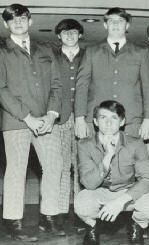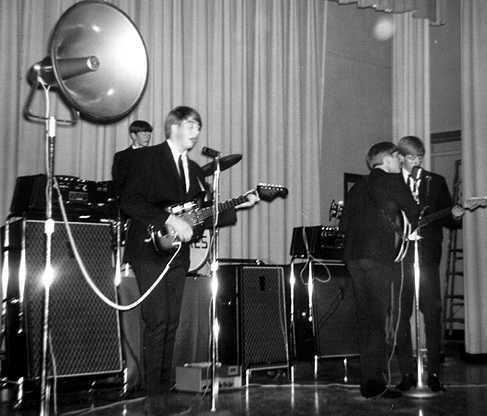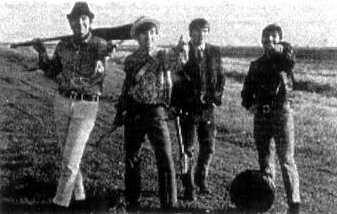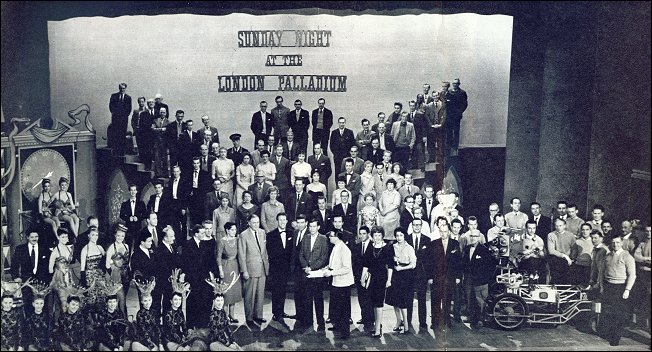
The Band

A month later, the boys decided to rededicate themselves and work even harder. They re-formed and gave the band a new name, The Dover Souls, after Ian's parent's favorite vacation spot.
It was at this time that Anthony began writing songs. The first were simplistic three-chord ballads to girls and growing up, but it was soon clear that the talent was there.
In the summer of 1960, Anthony wrote the first version of “Misty Monday Morning,” which would turn out to be the band's biggest hit. The Souls spent the next few months performing in front of small crowds at local clubs and sporting events, and quickly developed a following. By 1961, they were booking dates all over western England, including a gig in Liverpool at The Casbah Coffee Club, which was owned by Mona Best, Pete Best's Mother.
It was at this time that the
band met
Bill Harry, a childhood friend of John Lennon and the founder of
Mersey Beat magazine. After a beer-soaked evening with the boys in
The Blue Angel, he agreed to mention them in his magazine.

Things changed swiftly for the boys soon after, and the bookings began to multiply. Admittedly none of them were terribly business minded, and they were beginning to have trouble managing their schedules. After being offered a gig at the famous Marquee Club in the Soho section of London, the boys realized they needed a manager. Their old one-time band-mate, Reggie Leach, was already managing two other bands from the Manchester area so the boys approached him with the idea. Reggie agreed and contracted for ten percent of the band’s booking fees.
 Over the
next two years, the Souls played an exhausting schedule of one gig after
another—clubs and theatres from Scotland to Southampton, from London to Dublin.
They were one of the most prolific groups of the times, playing 320 gigs in 1962
alone, and the venues—as well as their paychecks—got bigger.
Over the
next two years, the Souls played an exhausting schedule of one gig after
another—clubs and theatres from Scotland to Southampton, from London to Dublin.
They were one of the most prolific groups of the times, playing 320 gigs in 1962
alone, and the venues—as well as their paychecks—got bigger.
Similarly, their fan-base was growing impressively. The first Dover Souls Fan Club formed in Manchester in 1962. One of the initial members was Marianne Faithful, an ardent devotee after seeing the band live at the unsavory Harmony Inn on Archer Street in Soho.
Although there was a stiff
competition from the more famous bands such as
The Beatles,
The Searchers,
The Fourmost and Gerry and the Pacemakers,
to name a few, word of The Dover Souls was
spreading like a gasoline fire. Nevertheless, it was difficult to get even the
slightest mention in the popular beat magazines of the day. Their biggest break
came when they got a prized spot competing in the January 1963 Battle of the
Bands, which was scheduled to be broadcast on the BBC television series,
Sunday Night at the London Palladium.
Gerry and the Pacemakers,
to name a few, word of The Dover Souls was
spreading like a gasoline fire. Nevertheless, it was difficult to get even the
slightest mention in the popular beat magazines of the day. Their biggest break
came when they got a prized spot competing in the January 1963 Battle of the
Bands, which was scheduled to be broadcast on the BBC television series,
Sunday Night at the London Palladium.
Their elation, however, was short lived: The BBC asked the Souls to perform as one of the “warm-up" bands. Their performance would not appear on the show.
Discouraged but ever the good sports, the Souls decided to “go on with the show.” Although they didn't get on TV that night, a producer, Joe Meek, happened to be in the crowd.
 Meek
, founder of
Triumph Records, liked what he heard. After the show, he approached Reggie
Leach, intent on signing the band. Leach, however, quite intoxicated, mistook
Meek’s offer as an attempt to “poach” his clients. The two ended up in a
scuffle and Leach broke Meek’s nose with a stool, telling Meek to “sod off.”
Meek
, founder of
Triumph Records, liked what he heard. After the show, he approached Reggie
Leach, intent on signing the band. Leach, however, quite intoxicated, mistook
Meek’s offer as an attempt to “poach” his clients. The two ended up in a
scuffle and Leach broke Meek’s nose with a stool, telling Meek to “sod off.”
Reggie Leach had recklessly squandered what would turn out to be the best opportunity the Dover Souls would ever have.
Main Page Early History Forming the Band 1964 The Hit 1965 The Break-up Anthony in New York Honey Vicarro 1966-Lads In UK The Reunions The Tragedy Smithe-Jones Bio Biggs Bio Tolliver Bio St. John Bio Discography Webmistress